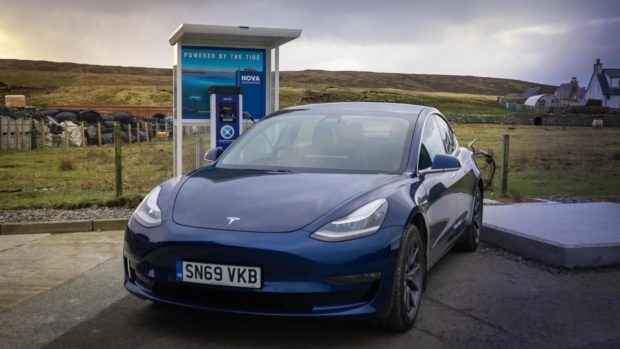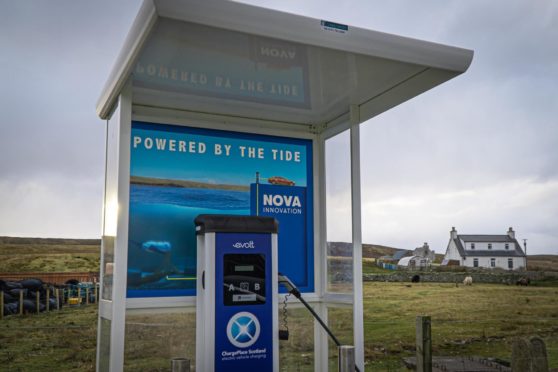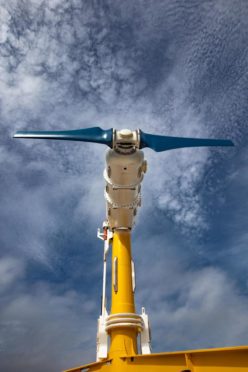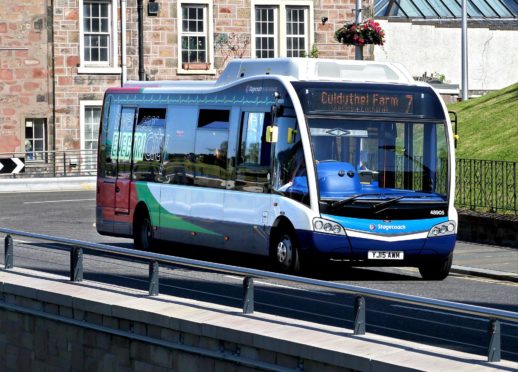Electric cars on Shetland can now be fuelled entirely by the power of the sea in a UK first.
Tidal turbines have been used to power local homes and businesses on the island for the last five years.
Now, Nova Innovation has utilised their invention to build the first-ever electric cars charge point where drivers can fill up directly from a tidal energy source.
The charge point is located on the shores of Bluemull Sound at Cullivoe harbour on the island of Yell.
Simon Forrest, CEO of Nova Innovation, described how their technology can help Scotland achieve their net-zero ambition.
He said: “Our technology generates electricity from the immense power of the seas, and it is changing the way we power our lives – from how we make a cup of tea to how we travel.
“We now have the reality of tidal powered cars, which demonstrates the huge steps forward we are making in tackling the climate emergency and achieving net-zero by working in harmony with our natural environment.”
Tidal charging is welcomed
Fiona Nicholson from Cullivoe is an electric car driver and welcomed the new addition as a benefit for the local community.
She said: “I am delighted that we have an EV charge point powered by the tide. I work in Lerwick, so I need access to a charge point, and it is exciting to have this on my doorstep.
“Most people in Shetland live close to the sea – to be able to harness the power of the tide in this way is a great way to use this resource.
“I have followed Nova Innovation from when they built their test model in Leith up until now.
“We are very lucky to have a long stretch of coastline in Shetland and I think there will be a lot of interest in this technology and how different businesses could use it.”
Scottish Government’s net-zero ambition
The Scottish Government is aiming for the country to become net-zero by 2045, which means greenhouse gates will not be omitted there.
To help with this, they are banning the sale of new cars powered solely by petrol or diesel by 2032.
Low-emission zones are also being introduced in the country’s biggest cities, including Aberdeen.
The Nova project received funding through Transport Scotland.
Stagecoach introduces more electric buses
Stagecoach announced that they will be introducing a further 46 new fully electric buses across the country, costing about £21.4m.
22 of these will be double-deckers and will be run in Aberdeen.
This new fleet will help improve air quality and help with the net-zero target.
The bus operator is targeting a zero-emissions bus fleet by 2035, with funding awarded by the Scottish Government to help them do this.
Charging infrastructure to be built
The funding will also go towards building electric infrastructure for depots, with SSE delivering this for the Aberdeen depot.
Sam Greer, regional director for Stagecoach in Scotland, said: “Sustainable public transport is critical to the future of our planet: decarbonising local journeys, reducing road congestion, improving air quality, and tackling climate change.
“We welcome today’s announcement by the Scottish Government of additional funding to support the roll-out of 46 new electric buses in Scotland.
“This major investment will also provide a boost for Scotland’s world-leading bus manufacturing sector, helping to protect and grow jobs in Scotland.
“As major investment is made in zero and low emission buses, it also enables us to build further on developing in skills and training for our engineering teams to maintain the new greener fleet as we transition to new zero-emission technologies.”




